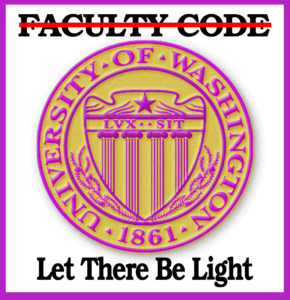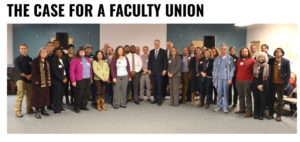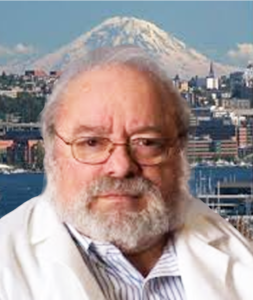THE FAILURE OF THE UW ADMISTRATION
The University of Washington faculty, like the faculty at other major American research universities is governed by a Faculty Code, a set of laws written by the Faculty Senate, voted on by the faculty, and enacted by the Regents. Sadly, this is a story about abuses by UW administrators all too willing to violate the UW Faculty Code. The pattern goes back to the very public problems when Phyllis Wise was Provost and before then. My experience is adding a new chapter.
My name is Stephen Schwartz. I am a tenured professor, very proud of my own achievements as one of the founders of the field of vascular biology, and a long-term activist for faculty rights. Many of you know me as the editor of this website, a site I founded off campus for discussion of UW issues as well as broader issues of interest to members of the UW community. Among other things THE-Ave has reported previously on abuse of the Faculty Code by UW administrators. It hurts me greatly to be in conflict with this institution that has done so much for my life and career.
Sadly, I recently started an adjudication under Chapter 28 of the Faculty Code. My charges allege that the Office of

The motto, “Lux Sit,” (let there be light) reflects 160 years of success of UW faculty: scientists, humanists, artists, engineers, sociologists, writers whose work puts this school, from a small American state, among the world’s great universities. Creations of that faculty .. from drugs to works of art, create a great deal of our state’s prosperity. Students come here not just to be taught but to work with this premier faculty. Unfortunately, the UW faculty now play little role in governing the University. Governance and control are largely in the hands of professional administrators, whose primary goals may be political but appear to be to protect the University from liability. In their pursuit of this goal, administrators are absolutely ruthless, and do not hesitate to violate the law, as my story shows.
the President and the Vice Chancellor for Academic Personnel have a pattern of violating state law regarding the investigation and discipline of faculty members accused of wrongdoing. Sadly, their behavior is quite common. Although her position is nominally academic, the major qualification of the Vice Chancellor is that she is a lawyer. Lawyers across the three UW campuses, hired as UW administrators, routinely and purposefully ignore procedural protections built into the law to protect faculty from false charges. The resulting system comes at a high cost to faculty who are given little chance to prove their innocence. Moreover, any system built without representation for the administration and the faculty, is fundamentally dishonest: a feature which is incompatible with the University’s commitment to academic integrity.
Part of the problem is that the University employs a large number of lawyers as administrators. Because of the title of administrator, these lawyers claim to not be subject to the ethical codes binding other attorneys including expectations that lawyers are truthful and follow the law. Nonetheless, faced with this large cadre of lawyers, and with the high costs of private attorneys, faculty are easily intimidated to effect their behavior and for reasons that may have nothing to do with charges brought against them.
My claims are supported by compelling evidence gathered using public records requests. This evidence begins in February 2016, when Vice Provost Cameron and the then Secretary of the Faculty Marcia Killien improperly published a substantive amendment to Chapter 25-71 of the Faculty Code. They did so under the guise of “housekeeping,” falsely claiming that the changes were required by federal regulations relating to research misconduct and, therefore did not require a vote of the Faculty. Documents produced in response to public records requests establish that Vice Provost Cameron knew this rationale was false at the time it was offered.
The changes made to Chapter 25-71 wrongfully stripped faculty of the right to detailed notice of charges before a dean or a chair authorizes an investigation by UW lawyers, an office called UCIRO. That office is again manned by UW lawyers who act as investigators, again without any of the limitations that require, for example, an attorney working for the Attorney General to inform a suspect that she or he has certain rights. Even attorneys working for Microsoft have to be clear that they represent the company’s interests.
Briefly, my story begins with threats that had been made to “get me” for criticisms about a medical school program at the new South Lake Union campus. Then, a year ago, I suspect as a follow on to these threats, false charges of racism and homophobia were made against me that could have ended my tenure. In the meantime I was removed as director of my highly successful National Institutes of Health sponsored training program. The program, funded at over a million dollars a year is among the most successful programs in the United States.
Although I was fully exonerated after a months long investigation by the UW lawyers of UCIRO, massive damage had been done to my reputation and to my training program. Even though I was restored as director of my program, the UW refused to take any action to address the damage done to the program by their actions. My requests to complete the investigation to identify who made the charges were also refused. Requests for use of UW Human Resources to address the effects of the charges were also refused. Subsequently, my chair retaliated by demeaning my work and lowering my rating from “outstanding” to “without merit.”
Despite the threats to “get me,” I cannot want to feel the UW wants to destroy my program; I do believe that this mess reflects abusive misuse of the faculty code to achieve some end I can not define.
Specifics:
- My chair, an interim appointee, filed charges with UCIRO without first informing me of any concerns and certainly not of the charges against me. He never offered to meet with me and any complainant. Despite the chair’s assertions that there were multiple sources for these charges, UCIRO could find only one source and that person refused to testify to the UCIRO investigators. Moreover, emails between UW lawyers and the chair suggest that the complainant may have been coached.
- Based merely on the unproven (and ultimately disproven) allegations, the department chair and the Dean of the School of Medicine immediately removed me from my position as PI on a NIH training grant. Only after four months of investigation was I restored to the PI position. Neither the Dean nor the Department Chair consulted with the Chair of the Faculty Senate before I was removed from the PI position. Simple requests, such as the use of HR to resolve the resulting conflicts, have all been refused. The School of Medicine has been adamant that the interim Chair and the Dean will not even write a letter of exoneration.
Because I believe my chair’s and dean’s actions were unfair and in violation of the Faculty Code, I hired an attorney. Together we have discovered the following facts that should make this case of interest to all faculty at the University:
- Vice Provost for Academic Personnel Cheryl Cameron and the former Secretary of the Faculty Marcia Killien improperly published a substantive amendment to Chapter 25-71 of the Faculty Code in February 2016. They did so under the guise of “housekeeping,” falsely claiming that the changes were required by federal regulations relating to research misconduct. The claim that the changes were only “housekeeping” allowed the Vice Provost and Secretary to avoid a Senate vote, wrongfully depriving all faculty of the right to vote on a substantive amendment of this part of the Code. They also effectively stripped the faculty of an important procedural right, one that might have helped me more quickly disprove the charges against me.
- The decision to punish me by removing me from my PI position, based only on unproven allegations, is part of a pattern and practice by the administration of imposing so-called “minor” punishments on faculty prior to any adjudication. This is in blatant violation of Chapter 28 of the Faculty Code.
- Confronted with the evidence of the administration’s systematic dishonesty and violation of the law, President Cauce, or lawyers acting in her name, has not even feigned shock, but has instead filed a response to my petition that effectively claims that the University can disregard the Faculty Code at will.
This experience, and multiple conversations with other faculty members, have convinced me that the actual process of disciplining faculty bears little resemblance to the process required by the Code. Because the University’s misconduct requires secrecy to persist, I have decided to publish the key documents related to my case. You can find links to the following documents HERE.
- My Petition starting a Chapter 28 adjudication against President Cauce, Vice Provost Cameron, Dean Paul Ramsey, the Secretary of the Faculty, and the chair of my department;
- The exhibits to my Petition;
- The Administration’s Response, redacted to remove the details of the charges against me, since those charges were found to be unsupported;
- My Motion to Strike the Administration’s Answer to My Petition;
- The initial ruling of the Chair of the Adjudication Panel, allowing the adjudication to proceed, redacted to remove the names of the hearing panel members;
- The entire response to the public records request that shows that Vice Provost Cameron and former Secretary of the Faculty Killien deliberately intended to mislead the faculty about the housekeeping changes to 25-71.
SUMMARY:
The AAUP, founded in 1915, has been the guardian of academic freedom, shared governance, and tenure at American universities. The UW chapter was founded in 1918 and helped create the Faculty Senate and the Faculty Code. Many of the discussions about the UW on this website quote from the AAUP listserv and relate ways the UW AAUP has fought for 100 years to build and maintain a system of shared governance.
My problem is not new. Back in 1918 the UW chapter of the American Association of University Professors was founded to create a system of shared governance. This system was intended to give faculty a voice, perhaps the major voice, in decisions of academic policy as well as the rules regulation faculty conduct. Since 1918, but especially in the last fifty years, growth of administration has overwhelmed faculty governance at schools across the US. Usually this leads to public concern about costs, a valid issue. One University, Western Governors University, has gone so far as to eliminate faculty altogether! I do not think that model works in a world class research institution like UW. I suggest, however, that the concern goes deeper, to the UW motto, “let there be light.” That ideal is the job of the faculty, not of administrators or of lawyers who work outside of the ethical codes of the Washington State Bar and certainly outside of the ethical and moral standards we should expect of this great University.
The other issue, and the one that has done the most harm to me, is the way the University uses lawyers as administrators. Like a large corporation, the UW hires large numbers of lawyers to do jobs where having a legal education is a plus. In a private setting, these attorneys handle many employment disputes every single day and do so as attorneys representing the interests of their employer. The same is true of lawyers working for the UW, except that under Washington’s constitution a lawyer can only represent the UW if she or he is working for the Attorney General of the State of Washington. None of these lawyers working as UW administrators are part of the AG’s office and, therefore, they claim not to be governed by the codes of the bar association. The result is at best deceptive to a faculty member who would be inclined to believe, for example, that a UCIRO investigator is perfectly neutral. That assumptions is just as false as it would be if the investigator were working for a King County prosecutor.

My experience has made me rethink the role of faculty union. About two years ago a group called “Faculty Forward,” partnered with SEIU 925 to form a voluntary faculty union. While I support SEIU’s efforts to bring fair wages to contingent faculty who may work for less than Seattle’s minimum wage, I have feared that SEIU would not be able to deal with a system like ours where elite faculty, tenured with high wages, must work along side less well rewarded academics. Perhaps I was wrong? A union contract, negotiated by lawyers working for the faculty, may be necessary if the Faculty Senate can no longer do its job.
Much of our case under Chapter 28 of the Faculty Code rests on the way this cadre of UW lawyers, again acting without the ethical constraints of the bar, have been able to reshape the Faculty Code. The Senate is simply unable to deal with this cadre of lawyers. Despite the image the public may have of shared governance, there is little prestige in serving as a senator. Even the Chair of the Senate serves for only one year and she has literally no staff resources other than whatever might be provided by the administration. A Senate committee, called the “code police,” may include lawyers but much of the work is done by faculty with no legal expertise. Even the Secretary of the Faculty, elected by the faculty and charged officially with the job of handling code issues, has only held a law degree twice in the several decades I have been at the UW.
The result for a faculty member under attack by the UW is horrible. These UW lawyers have much more experience and resources than a faculty member. Any faculty member dealing with a UW lawyer who has not consulted an attorney is at a real disadvantage. If I were unrepresented, the UW legal staff would be and has been there to oppose my interests.
The Washington State Attorney General is no help because his office defines its role as the attorney for the administration. Because I am represented, now at a cost of over $60,000, the UW has employed an outside law firm to pursue its case. This firm acts as assistants to the Attorney General since the UW lawyers, not subject to the bar, would not be allowed to represent the UW if we end up in Superior Court.
In my opinion my chance of succeeding in this action against the UW without a lawyer would be virtually impossible. Besides knowing the law and the associated court procedures, my attorney knows the information I need to win, the legal procedures to obtain that information, how to depose and present witnesses and documents, and, most important, how to prevent the UW and its attorneys from using unfair tactics to win the case.

